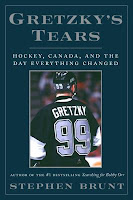Ten Great Reads for Fall
Ten Great Reads for Fall
Pete's Picks presented at the STARTA (St. Albert Retired Teachers Association) breakfast meeting on October 30th. Thank you to hosts Brenda Kane and Jack Flaherty!
Two English ghost stories for Halloween:
Sarah Waters The Little Stranger
Waters is the critically-acclaimed author of neo-Victorian novels like Fingersmith and Tipping the Velvet. She moved forward in time with her last novel, The Night Watch to the Second World War. Now she looks at the grey world of postwar Britain. with her excellent take on the classic English haunted house story. A doctor is called to a decaying family manor in England to treat a young man’s war injury, but an evil presence in the house soon makes itself known. Some resemblance to Shirley Jackson’s classic The Haunting of Hill House with a little Edgar Allan Poe too. Shortlisted for the 2009 Booker Prize.
Audrey Niffenegger Her Fearful Symmetry
The long-awaited new novel from the author of The Time Traveler’s Wife is a bit of a ghost story, set beside London’s famed Highgate Cemetery. Moving into a London flat they inherited from their aunt Elspeth, Chicago identical twins Valentina and Julia find aunt Elspeth still hanging about as a meddling ghost. Like The Time Traveler’s Wife at its heart this is a romance, albeit an odd one.
A crime novel, for grey, grim November:
 sson The Girl Who Played with Fire
sson The Girl Who Played with Fire
Scandinavian crime fiction is hot. Kenneth Branaugh brought Henning Mankell's Wallander books to BBC/PBS recently. Swede Stieg Larsson’s first thriller, The Girl With a Dragon Tattoo, was a critical and a popular success all over the world. Computer hacker Lisbeth Salander and journalist Mikael Blomkvist are back, this time in the thick of the action, with Salander accused of the murder of two journalists about to expose a trafficking business. Larsson died of a heart attack in 2004 just after delivering the manuscripts for three of these novels, so it is doubly sad finishing these books.
A war novel for Remembrance Day:
Like the Larsson book, this is a posthumous novel, but only in that this is the first time it has been published in English, over 60 years after its initial publication in German. It was actually written in Germany during the Second World War and published – and was a bestseller – in German in 1947. But no English language publisher saw fit to publish until now. An excellent but sad book, about a couple who try to defy the Nazis in their own small way.
An up and comer:
Chaon is an American whose first novel, You Remind Me of Me, was excellent. This new one might be even better. Chaon starts with seemingly unrelated characters and slowly brings them together. This technique reminds me a bit of Kate Atkinson and her tightly-wound plots. Here Chaon deftly juggles three intriguing plots about people dropping their old lives and remaking themselves. Ryan drops out of college to live in the woods, Lucy runs off with her high school teacher and Miles searches for his elusive twin brother. Ch aon brings the three together.
aon brings the three together.
Local Hero:
Thomas Trofimuk Waiting for Columbus
The Edmonton writer had two novels on the scoreboard, one an Alberta novel of the year, and then he stepped up to the plate and hit this third one out of the park. This is a great read, a combination of a strong, compelling story with interesting characters and beautiful writing. A modern-day man is admitted to a Spanish mental hospital convinced he is Christopher Columbus. But who is he really?
He's been dead five centuries, but Henry VIII is a having a moment, with The Tudors on TV, Pope Benedict inviting Anglicans to leave Henry's church and now this superb Tudor-era novel winning the Booker Prize. Mantel focuses on the turbulent years of Henry's marriage to Anne Boleyn, telling the story through the eyes of his crafty advisor, Thomas Cromwell. A long read but worth it.
Three non-fiction tales:
Globe and Mail columnist Stephen Brunt stopped by the Library last fall for a reading. He tantalized us with talk of his next book which would focus on the Wayne Gretzky trade. And now here is the book: Gretzky’s Tears - a must-read for Oilers and Gretzky fans and anyone interested in a brilliant look at how our game changed after “The Trade”. Brunt is not only one of Canada’s best sports writers, he’s one of the best writers period.
A true story of classic adventure in the jungles of the Amazon with this true story of classic adventure. In 1925 British explorer Percy Fawcett entered the Amazon jungle in search of an ancient civilization and was never seen again. Grann intersperses the story of F awcett with his own search for the truth. Intriguing.
awcett with his own search for the truth. Intriguing.
The cliché is true: truth is stranger than fiction. The intriguing true story of iconic businessman Henry Ford’s quixotic attempt to build a utopia in Brazil’s Amazonian jungle. From the 1920s through 1945 Ford tried to remake the rainforest into an outpost of white picket fence America with a rubber plantation as its heart.










